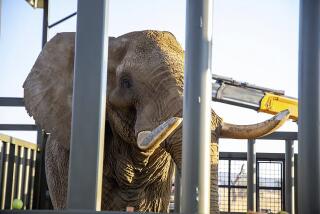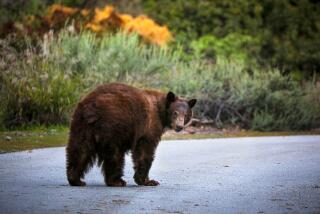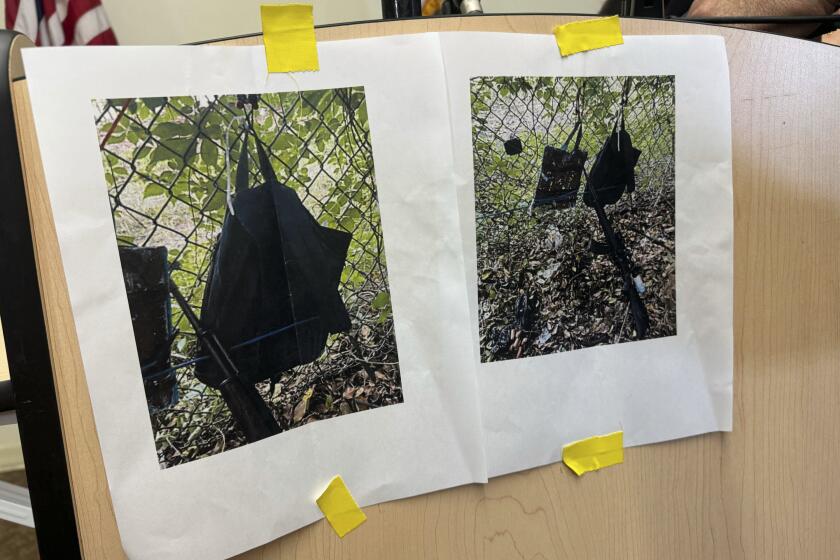African elephant slaughter nears tipping point toward extinction
African elephants face a looming threat of extinction. Add that to a summer of bad news.
Since the beginning of June, we have seen a passenger jet shot down over Ukraine; an army of Islamic maniacs committing atrocities in Iraq; Israelis and Palestinians acting out their fears and hatreds in Gaza; hundreds of Central American kids running the U.S.-Mexico border; police battling protesters in suburban St. Louis; wildfires burning up the West; not to mention the more personal tragedy of Robin Williams’ suicide.
The constant suffering humans inflict upon one another is gut-wrenching, of course. It takes a cold heart not to feel empathy for the innocents facing death and dislocation in war zones or to have a bit of compassion for children seeking refuge from drug gangs. Still, as awful as we can be to one another, we are not running out of human beings (unless the worst-case scenarios about climate change come true, in which case we are all doomed). African elephants, on the other hand, are in short supply, and their numbers are falling fast.
There are buyers in China who will pay a high price for the elephants’ ivory tusks and impoverished people in Africa who are willing to destroy their continent’s most magnificent species in order to make money meeting the demand for such a rare commodity. In recent years, the greedy slaughter that feeds the voracious Asian ivory market has spiked dramatically; the share of elephant deaths attributed to poaching has shot up from 25% a decade ago to 65% today.
In just three years, the number of elephants in Tanzania’s Selous Game Reserve fell from 40,000 to 13,000. According to a comprehensive new scientific study, poachers throughout Africa killed an estimated 100,000 elephants between 2010 and 2012. With rough estimates putting the number of remaining elephants at around 400,000, that level of loss is obviously unsustainable. If it is not stopped, Africa could soon be bereft of any elephants roaming wild and free.
Some African countries, such as Botswana, have done better than others protecting their elephant herds, but in regions where governments are weak and civil unrest is prevalent, poachers operate with near impunity. China’s government, worried that it may have an image problem, has pledged to educate its people about the awful consequences of the ivory trade. Many Chinese have the mistaken belief that the elephants’ tusks grow back and have no idea the animals are killed for their ivory, so an education campaign would be useful. But the promises of Chinese bureaucrats may not amount to much when weighed against the influence of shady Chinese businessmen who are getting rich selling ivory.
I spoke to a U.S. State Department veteran with extensive experience in Africa who told me the kingpins in the smuggling operations hire squads of Sudanese men, promising to take care of their families and to pay the men well. The squads cross into neighboring African countries and spend three months hunting elephants and taking their tusks. When they return to Sudan, there are ships on the coast standing ready to transport the contraband to China. It’s an efficient system, which the disorganized nations of central Africa have no power – and perhaps no willingness – to halt.
In an Associated Press interview, Iain Douglas-Hamilton, founder of Save the Elephants, expressed a measure of optimism, despite the dire realities. He was around in the 1970s and ‘80s when Japanese demand was driving another poaching frenzy.
“As a collective group we stopped that killing, and in the savannas there was a reprieve of 20 years,” Douglas-Hamilton said. “I believe we can do it again.”
I hope he is right, but “reprieve” is a disturbing word. A reprieve is what is granted a man on death row, and it is temporary.
There are endless tragedies that fill the news cycles, but contemplating a world without its largest land mammals goes deeper than tragedy. Has this planet felt the tread of any other beast that is more imposing, yet beloved? Is there any other animal that has inspired more awe and delight? If human beings fail to protect this remarkable species, we will prove our unworthiness to claim dominion over creation. We will be more fallen than Adam and as cursed as Cain.
More to Read
A cure for the common opinion
Get thought-provoking perspectives with our weekly newsletter.
You may occasionally receive promotional content from the Los Angeles Times.











